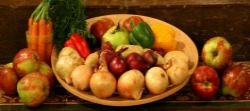Breastfeeding Nutrition Guide

Now that I covered breastfeeding diet considerations, breastfeeding nutrition is the next must-know topic.
There are some common breastfeeding nutrition requirements. You probably modified your diet to adapt some (if not all) of them when you got pregnant and won’t need to do much.
If not, now is a good time to make changes to the way your entire family eats. As healthier foods become more available, it is only natural to strive to live healthier.
Healthy diet strengthens your immune system, increases energy levels, and creates positive atmosphere for the entire family.
To meet daily breastfeeding nutrition requirements for nutrients below, read the labels, look at the serving sizes and do your math. Do it once, get the feel of how much each serving is and you will know approximately how much you need daily.
To-Eat List:
- Complex carbohydrates should account for 50% of your daily calorie intake. Carbohydrates ensure high energy level required for successful milk production.
Sources: fruits, whole-wheat pasta, grains, beans.
- Unsaturated fats should account for 30% of daily calorie intake. Vitamins A, D, E, K are fat-soluble. In addition, fats are the sources of essential fatty acids.
Sources: soybeans, sunflower seeds, fish and corn oils, nuts, olives, sesame seeds, almonds, seafood (salmon, tuna, mackerel, sardines, cod).
- Proteins should account for 20% of daily calorie intake. Proteins are important cell-building blocks.
Sources: seafood, poultry white meat, dairy products, beans, eggs, soy, lean beef and pork, wheat gluten (aka mock duck, gluten meat), nuts. Quinoa, spelt (hulled wheat), polenta (type of cornmeal), panicum, buckwheat are rich in easily-absorbed proteins. These are perfect proteins for vegetarians.
- Continue taking your prenatal vitamins. Make sure they contain fatty acids essential for baby’s brain and eye development. If you follow all breastfeeding nutrition guidelines and eat a well-balanced diet, you and your baby should technically be getting enough vitamins and minerals. However, you don't know how much gets fully absorbed. Any extra unused vitamins and minerals will find their way out of your body.
- Check your calcium intake. Daily requirement is 1,000 mg. On average, your baby grows one third of what his/her growth will be during the first 1.5 years. Read this line again! Think how much work your baby’s bones are doing! Calcium is the building material for bones. If your diet is poor in calcium, it will be drawn from your bones. If that is not enough, the baby is at risk of developing rickets.
Sources: Milk, plain non-fat yogurt (8 ounces – 452 mg of calcium), cottage cheese, cheeses (best sources: Romano, Swiss, part-skim ricotta, American, provolone), cabbage, canned sardines with the bones, salmon, dried beans, calcium-enriched tofu, turnip greens, calcium-fortified orange juice, cooked soybeans, soy beverages with added calcium (368 mg in one cup), raw or cooked broccoli, spinach, calcium-fortified cereal, collard greens, seaweed.
- Make sure you get enough fatty acids. Fatty acids stimulate brain and eye development. The general breastfeeding nutrition norm is 12 ounces of seafood weekly. Many seafood types contain high levels of mercury (shark, swordfish, mackerel). Consult your doctor for breastfeeding nutrition guidelines on the safest seafood types in your area.
Sources: salmon, catfish, sardines (the same you eat for calcium), canned light tuna, tilapia, cod, Pollack, scallops, shrimp, crab, clams, flaxseed (linseed), soya oil, hemp oil, rapeseed (canola) oil, pumpkin seeds, sunflower seeds, walnuts, leafy vegetables.
- Iron is essential for blood-producing function. Severe iron deficiency may lead to anemia. Iron is best absorbed if consumed in combination with vitamin C (fruit and vegetable juices). A newborn is usually born with an iron reserve to keep him/her going for the first six months. A breastfeeding mother saves some iron too during the menstruation-free period. So with an adequate daily iron intake both the mother and the baby will be iron-rich till the solids start.
Sources: clams (same ones you eat for fatty acids), iron-fortified cereals, oysters, organ or variety meats (kidney, liver, heart, giblets), poultry, cooked soybeans (9 mg in one cup), roasted pumpkin and squash seeds, white beans (8 mg in one cup), lentils, spinach, pistachios, tofu, iron-fortified breads, seaweed (contains more easily-absorbed iron that any other product).
- Phosphorus participates in bones and teeth formation. Daily nursing nutrition requirement for a baby is 100-250 mg, for a breastfeeding mother – 700-1250 mg.
Sources: protein-rich foods (milk, meats), breads, cereals, seafood.
- Iodine promotes normal mental development. It also participates in normal development of a thyroid gland. Daily requirement for a baby is 110-130 mcg (microgram), for a breastfeeding mother – 290 mcg.
Sources: seaweed (kelp, arame), iodine-fortified (iodized) salt, some seafood, cranberries, probiotic-rich foods (organic yogurt), strawberries, dairy products, potatoes.
- Vitamin A is essential for eye development. It also promotes healthy skin, mucous membranes, and growth. Daily requirement for a baby is 400-500 AI (adequate intakes), for a breastfeeding mother – 1200-1300 AI.
Sources: bright-colored raw vegetables (carrots, onions, red bell peppers, tomatoes), some organ or variety meats (beef liver, pork liver, chicken liver, turkey liver), fish liver, sweet potatoes, kale, butter, spinach, pumpkin, collard greens, broccoli leaves and florets, cantaloupe.
- Vitamin B complex plays an important role in cell metabolism. It enhances immune and nervous system function. Any vitamin B deficiency may lead to depression and anxiety in breastfeeding mothers.
Sources: whole grains, oats, eggs, green vegetables, bananas, fish, lentils, seaweed (ideal for vegans), brewer’s yeast (used for beer brewing), beans, potatoes.
- Vitamin D promotes healthy bone development. It is essential for your baby’s growing body. The best source of vitamin D is sunlight. However, we don’t usually expose newborns to direct sunlight. Our breast milk may not contain enough vitamin D. Therefore, exclusively breastfed babied need to be supplemented with liquid vitamin D beginning at birth. Daily requirement for a baby is 400 IU (international units).
Allergy Alert: Read the label of your vitamin D supplement. Some contain corn oil or syrup. It is a tiny bit of it in every 400 IU, but it is enough for someone allergic to corn. The only corn-free vitamin D I found was at Whole Foods. The brand is Carlson. Check the label.
Sources for Mom: wild salmon (3,000 IU in one fillet!), light tuna, flounder, vitamin D-fortified milk, Vitamin D-fortified cereal, pork ribs, eggs (organic), some mushrooms (shiitake), some organ or variety meats (beef liver), ricotta cheese.
If you start questioning whether it is easier to switch to formula instead of following all these breastfeeding nutrition rules, keep the following in mind. Breast milk is the only source of easily-digestible and fully-absorbed vitamins and minerals. Formula list of ingredients may look impressive, but it only shows how much of each nutrient enters the body. But how much is actually absorbed?
There are many ways to show your love and devotion to your kids and to win their trust. Breastfeeding is the most natural one.
Yours,
Viktoriya
Back to top of Breastfeeding Nutrition>Breastfeeding Diet> Breastfeeding Home










